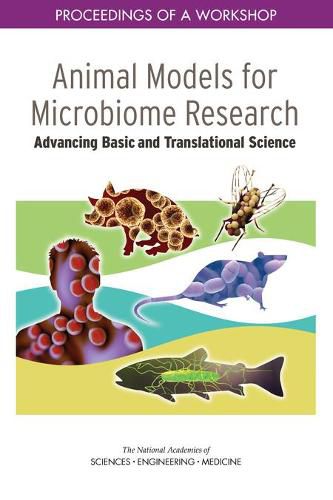Readings Newsletter
Become a Readings Member to make your shopping experience even easier.
Sign in or sign up for free!
You’re not far away from qualifying for FREE standard shipping within Australia
You’ve qualified for FREE standard shipping within Australia
The cart is loading…






The surface of the human body and its mucous membranes are heavily colonized by microorganisms. Our understanding of the contributions that complex microbial communities make to health and disease is advancing rapidly. Most microbiome research to date has focused on the mouse as a model organism for delineating the mechanisms that shape the assembly and dynamic operations of microbial communities. However, the mouse is not a perfect surrogate for studying different aspects of the microbiome and how it responds to various environmental and host stimuli, and as a result, researchers have been conducting microbiome studies in other animals.
To examine the different animal models researchers employ in microbiome studies and to better understand the strengths and weaknesses of each of these model organisms as they relate to human and nonhuman health and disease, the Roundtable on Science and Welfare in Laboratory Animal Use of the National Academies of Sciences, Engineering, and Medicine convened a workshop in December 2016. The workshop participants explored how to improve the depth and breadth of analysis of microbial communities using various model organisms, the challenges of standardization and biological variability that are inherent in gnotobiotic animal-based research, the predictability and translatability of preclinical studies to humans, and strategies for expanding the infrastructure and tools for conducting studies in these types of models. This publication summarizes the presentations and discussions from the workshop.
$9.00 standard shipping within Australia
FREE standard shipping within Australia for orders over $100.00
Express & International shipping calculated at checkout
The surface of the human body and its mucous membranes are heavily colonized by microorganisms. Our understanding of the contributions that complex microbial communities make to health and disease is advancing rapidly. Most microbiome research to date has focused on the mouse as a model organism for delineating the mechanisms that shape the assembly and dynamic operations of microbial communities. However, the mouse is not a perfect surrogate for studying different aspects of the microbiome and how it responds to various environmental and host stimuli, and as a result, researchers have been conducting microbiome studies in other animals.
To examine the different animal models researchers employ in microbiome studies and to better understand the strengths and weaknesses of each of these model organisms as they relate to human and nonhuman health and disease, the Roundtable on Science and Welfare in Laboratory Animal Use of the National Academies of Sciences, Engineering, and Medicine convened a workshop in December 2016. The workshop participants explored how to improve the depth and breadth of analysis of microbial communities using various model organisms, the challenges of standardization and biological variability that are inherent in gnotobiotic animal-based research, the predictability and translatability of preclinical studies to humans, and strategies for expanding the infrastructure and tools for conducting studies in these types of models. This publication summarizes the presentations and discussions from the workshop.